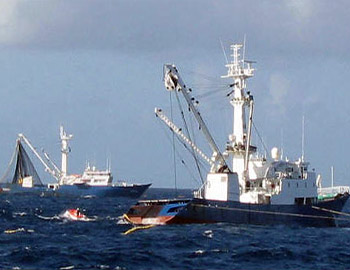INTERATUN rejects EU-Papua New Guinea accord
FIS | Friday, July 10, 2009
INTERATUN rejects EU-Papua New Guinea accord

By Analia Murias
The Inter-Professional Tuna Organisation (INTERATUN) warned that the European tuna fishing industry could be in danger if greater benefits are granted to Papua New Guinea.
The European Union (EU) Agriculture and Fisheries Council will decide on whether or not to approve the EU-Pacific Economic Partnership Agreement (EPA) on Monday, 13 July, which will be applied to those countries that subscribed to the interim agreement: Papua New Guinea and Fiji.
Within the framework of the negotiation of said Agreement, one of the main factors is the rescission of the norms of origin of tuna-sourced products (Paragraph 1604), a decision that directly affects a product sensitive to the Community’s industry and those of Africa, the Caribbean and the Pacific (ACP) nations.
INTERATUN urges the European Commission (EC) not to approve the Partnership Agreement in its next meeting of the Agriculture and Fisheries Council. It asks that it conduct a detailed study and consult the Community tuna fishing industry before taking any decision on the issue, given the serious consequences the Agreement would have on the Community tuna complex, concerning fleets and canned tuna processing, and on other countries that hold EU preferential agreements.
In addition, the entity expects the EC to present a report on the impact of the measure on the global tuna fishing sector.
Papua New Guinea based its negotiations for the rescission of these norms of origin on the argument that an alleged tuna supply shortage of European or ACP origin is the fundamental factor limiting its industry development.
The rescission of the norms of origin would allow its processed tuna-based products access to the EU free of tariffs no matter what its origin,” reads INTERATUN’s statement.
At present, only tuna fished by EU or ACP-nation vessels benefit from this tariff-free access.
According to INTERATUN, the alleged tuna supply shortage does not correspond to reality, since Papua New Guinea tuna captures surpassed 200,000 tonnes in 2007. Domestic processed tuna exports to the EU in the same year totalled 763 tonnes of tuna loins and 16,299 tonnes of canned tuna, available data indicates.
Therefore, Papua New Guinea vessels fish sufficiently so as to quadruple their production of loins and canned products without the need for other provisions.
Rescinding the norms of origin would also favour new investments by the main competitors of the European tuna industry cluster: Thailand, the Philippines, Taiwan and China.
These countries make investments in Papua New Guinea in exchange for fishing licenses, with which they would increase their supply the Community market and exert greater pressure on the Central and Western Pacific tuna, and so place its sustainability at risk.
“It is well known that Papua New Guinea has been wholly against [allowing] the Community fleet access to the Central and Western Pacific Ocean. Therefore, if its true intention were to guarantee tuna supply with the Papua New Guinea-origin certification, it could have favoured [permitting] access to this area by the EU fleet and not by our competitors,” INTERATUN continues.
The fishers of Southeast Asia – the Spanish and Community tuna fishing industry’s main competitors – are ensuring their products enter the EU “in unsurpassable conditions,” the European organisation adds.
On the basis of detailed arguments, INTERATUN states the attitude of the European Commission is incomprehensible as it endangers the competitiveness and future viability of the Community tuna industry and the countries protected under ACP regimes and the Generalised System of Preferences (GSP+).





